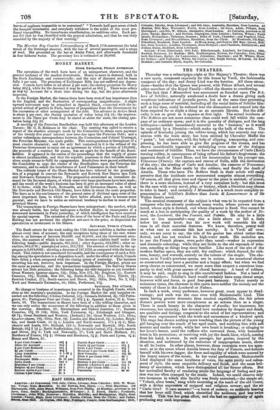THE THEATRES.
Thursday was a subscriptien-night at Her Majesty's Theatre; there was a new opera, composed expressly for this house by Verdi, the fashionable composer of the day; and Jenny Lind was the heroine. All these attrac- tions—besides that the Queen was present, with Prince Albert, and several other members of the Royal Family—filled the theatre to overflowing.
The fact that I Alasnadieri was announced as founded upon The Rob- bers of Schiller, naturally awakened a doubt how a drama giving such wondrous indications of juvenile power, but at the Rune time presenting such a huge mass of material, including all the social hates of Schiller him- self at the time, could be reduced into the dimensions and coaxed into the form required for so slight a thing as an operatic libretto. But the diffi- culty is not so great as it appears at first sight. The actual incidents of The Robbers are not more numerous than could well fall within the cora pass of an ordinary opera; and it is the quantity of dialogue, and the long soliloquies—neither immediately essential to the " business," as it would be regarded by a librettist—which make up the bulk of the work. The episode of Kosinsky joining the robber-troop, which has scarcely any con- nexion with the main story, has been omitted by Chevalier Maffei the "poets"; but otherwise with the help of clipping, transposing, and com- pressing, he has been able to give the progress of the drama, and has shown considerable ingenuity in embodying even some of the dialogue and sentiment of Schiller. Thus, we have the circumstance of Carlo (Karl) turning robber, in consequence of being refused his father's forgiveness; the apparent death of Count Moor, and his incarceration by his younger son, Francesco (Franz); the capture and rescue of Rolla, with the destruction of the city; the meeting of Carlo and Amalie; the remorse of Francesco; the attack on the Moor castle by the robbers; and finally the death of Amelia. Those who have The Robbers fresh in their minds will easily perceive that the incidents now enumerated comprise almost everything. Of course, all that gives tone and vigour to the piece is omitted; of course, there is a mere skeleton, instead of a very corpulent body : but this must be the case with every novel, play, or history, which a librettist may choose to take in hand; and certainly I Moumadieri is a much more complete re- presentation of Schiller's Robbers than Lucia di Lammermoor is of Sir Walter Scott's novel.
The musical treatment of the subject is what was to be expected from a composer who has already produced many works, whose powers are mai • tared, whose style is formed, and whose character is fixed. One cannot be much at a loss in anticipating the quality of a work by the author of Er- nani, the Lombardi, the Due Foscari, and Nabo. He May be a little more or less successful—may rise a little above or fall a little below his usual level; but his new work will resemble his old ones in all their essential features. We knew, therefore pretty well at what rate to estimate this last novelty. It is Verdi all over; only, we are sorry to say, the tide of his genius has ebbed rather than flowed, and has not reached its high-water mark. His melodies are, to use the French phrase, even paler than usual—weaker in expression and dramatic colouring; while they are liable to the old reproach of trite- ness, sounding as things long since familiar. Like most of the airs of the modern Italian opera, they are cold, dry outlines; which depend; for rich- ness, beauty, and warmth, entirely on the talents of the singer. The cho- ruses, as in Verdi's previous operas, are in unison. An occasional chorus so constructed may have a peculiar and a happy effect; but when we find every chorus so constructed, we must more than suspect a conscious inca- pacity to deal with great masses of choral harmony. A band of robbers, it may be said, ought to sing in this uncultivated fashion. Not a band of German robbers: Schiller's band would certainly have sung choral songs, however wild and fierce, in good four-part harmony. Taken merely as unisonous tunes, the choruses in this opera have neither the melody nor the variety of those in the Lombardi or Nabuco.
In such a work, every performer, however great, must appear to disad- vantage; and such was the case even with Mademoiselle Lind. This opera having greater dramatic than musical capabilities, the fair prima donna's powers were more conspicuous as an actress than as a singer. There is much beauty in the character of Amaka: her innocence, her sweetness, her sincerity, her devoted love unshaken by despair and death, are qualities and feelings congenial to the mind of her representative; and they were represented with the truth and earnestness of a kindred spirit. The stage has shown nothing more touching than the picture of the young girl hanging over the couch of her aged uncle, and soothing him with soft accents and tender words, while her own heart is breaking; or clinging to her lover's breast, amid the ruffians who surround them, with boundless trust in his protection; or receiving with joy the death-blow, which, coming from his hand, is sweet. In such passages, her genius, inspired by the situation, and unfettered by the restraints of inappropriate music, shone in all its lustre. In other places, however, these restraints were too appa- rent; as in the scene where Amelia braves the fury of Francis, and defends herself with his own dagger, the force and rapidity of which were marred by the heavy nature of the music. In her vocal performance, Mademoiselle Lind displayed the same loveliness of voice, the same purity and refine- ment of style, the same exquisite delicacy and finish, and the same bril- liancy of execution, which have distinguished all her former efforts. But her unrivalled faculty of rendering music the language of feeling and pas- sion was too often cramped by the music. Indeed, we could observe only two instances in which this faculty was freely exercised,—the simple air, " Volasti, alma beats," sung while mourning at the tomb of the old Count, with a divine expression of resigned and religious sorrow; and the air "Carlo vive? 0 caro accentol "—a burst of ecstacy, on suddenly hearing that her lover still lived, which electrified the audience, and was twice encored. This was her great effort, and she had no opportunity of again producing any such impression.
Gardoni did all that could be done for the part of Carlo. He acted with fire and passion; but the music of his part was so hopelessly cold that all his exertions to infuse warmth and life into it were vain. Lablache was in no better position: his representation of the aged Count was deeply pathetic; but the beauties of his performance were wholly independent of the music, except in the tender duet between the father and son in the final scene, which received an encore. Coletti, in Francesco, had to struggle with music which was either entirely unmeaning, or (as in the description of the awful dream) absolutely false in its expression.
The audience were liberal of their applause,—repeatedly "calling" the principal performers, and Verdi, who appeared in the orchestra as con- ductor on this occasion, for the first time in England. I Afasnadieri will doubtless draw crowds so long as Jenny Lind performs the heroine; yet this opera cannot have a mid success. We are far, however, from blaming Mr. Lumley for producing it. On the contrary, it was a likeral policy— perhaps his duty, as manager of this most fashionable establishment, to produce the newest work which he could obtain from the favourite Italian composer of the day, whose operas are stock pieces in every Italian theatre in Europe. That it should be so, the more is the pity; but that it is so, is sufficient warrant for the manager of Her Majesty's Theatre.
The ballet department receives a new impulse this week from the arrival of Taglioni; who seems to have come not only with her inimitable grace, but with a new stock of vigour. Nothing could be finer than her dancing in the famous "pea de quatre " ; in which she was joined by Cerito, Car- lotta Grisi, and Rosati. The old enthusiasm revived with the "pea": bouquets were thrown in profusion, and each of the artistes kindly showed a delight at the plaudits gained by the others,—which delight was, of course, most sincere!



























 Previous page
Previous page